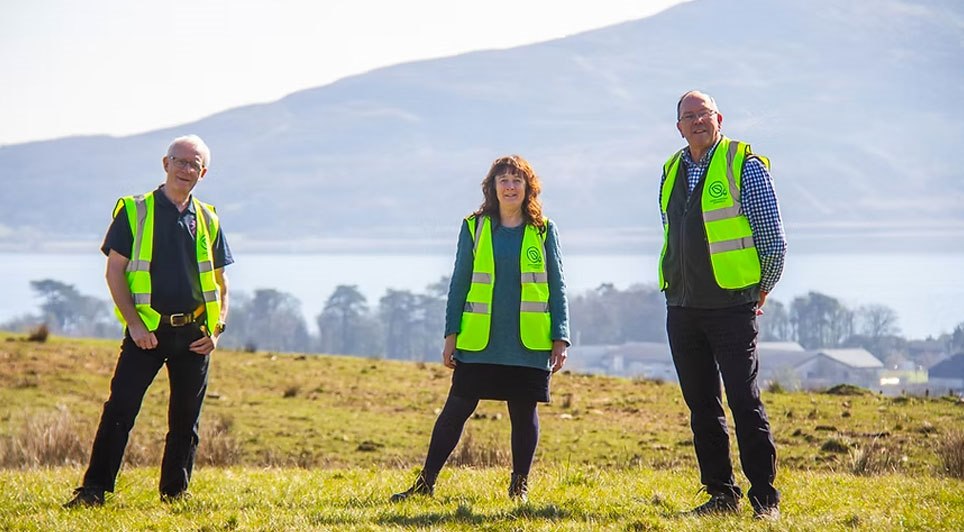A new study has claimed that more than 1,000 workers could die each year due to "inadequate safeguards" in workplaces when dealing with dust known to cause cancer and other diseases.
Many more lives are also being put at risk by the lack of safeguards, academics at the University of Stirling said.
Respirable crystalline silica is a dust created during work operations involving stone, rock, concrete, brick, mortar, plaster and industrial sand. It is second only to asbestos as a cause of occupational cancer deaths and exposure to it via inhalation can cause other illnesses such as silicosis, tuberculosis, kidney disease, chronic obstructive pulmonary disease and arthritis.
The study, carried out by Professor Rory O'Neill and Professor Andrew Watterson of the University's Occupational and Environmental Health and Safety Research Group, is in response to the Health and Safety Executive's (HSE) reluctance to tighten the current silica exposure standard. This is what regulates the amount of silica workers can safely be exposed to in the workplace.
The HSE has previously argued that technological limitations make monitoring below the current exposure standard impractical.
Professor Rory O'Neill argued: "The HSE says monitoring technology isn't good enough yet to measure lower levels of silica dust, so we must stick with the same deadly, higher but measurable standard. It is wrong on both counts. The increasingly toothless safety watchdog is regurgitating the line promoted by the industry lobby, placing vested interests above workers' health.
"Modern science can obtain and analyse dust on Mars. If HSE's science can't obtain and analyse adequately one of the most commonly encountered and deadly workplace dust exposures here on Earth, you have to ask who on Earth is the watchdog protecting?"
In America, the equivalent of the HSE – the Occupational Safety and Health Administration (OSHA) – is also arguing for a change in the rules that would see the exposure standard to silica halved. It claims that monitoring a tighter exposure standard is technically feasible and would save thousands of lives.
Professor Andrew Watterson added: "OSHA says a tighter standard is perfectly possible, can be monitored in the workplace and would save hundreds of lives and billions of dollars each year. Canadian provinces already monitor and enforce a tighter standard still.
"The current lax legal occupational exposure standard in the UK guarantees another generation will be blighted by entirely preventable, deadly and disabling conditions. Yet the HSE is actively promoting an industry-supported but unsustainable argument in the UK and in Europe that the current standard must stay."
(JP/IT)
Construction News
23/07/2014
Concern Over Lack Of Silica Safeguards


15/04/2025
Construction of a £70 million student accommodation development at 292-298 St Vincent Street in Glasgow has reached a significant milestone, with the building now visibly rising from the ground.
Drone footage has captured the progress of the project, which is a partnership between developer Artisa

15/04/2025
Energy regulator Ofgem is expected to confirm today (April 15) its finalised Connections Reform process, designed to expedite grid connections for renewable energy projects that are ready and crucial for achieving the UK's clean power targets for 2030 and beyond.
The new connections system, anticip

15/04/2025
The ambitious transformation of Glasgow’s landmark George Square has moved into a tangible phase with the commencement of the erection of hoardings around the perimeter of the civic space. Starting today, the hoardings will enclose the Square for the duration of its 18-month redevelopment.
The pane

15/04/2025
Members of the public are invited to attend a consultation feedback event to discuss the proposed infrastructure associated with a new underground electricity transmission cable between the Kinardochy and Errochty substations in Perthshire.
The event will take place on Monday, 28 April, from 4 pm t

15/04/2025
Turner & Townsend have been appointed as project managers to develop a business case for the potential extension of the Borders Railway beyond its current terminus at Tweedbank to Hawick and Carlisle.
This key appointment will enable crucial work to progress on the project, including feasibility s

15/04/2025
Arran Community Renewables, a Community Benefit Society based on the Isle of Arran, has secured planning consent for a 6 MW solar farm. The Glenkiln Solar Farm, located approximately 1km west of Lamlash, is projected to generate 5,600MWh of clean renewable energy annually from 2027.
The £5 million

15/04/2025
A new Route Map has been published by the Scottish Land Commission (SLC) to ensure communities across Scotland secure tangible and long-lasting benefits from nature restoration projects and investment in the country's natural environment.
The practical guide is designed for landowners, developers,

15/04/2025
Award-winning principal contractor Procast Group has further expanded its presence across Scotland with the opening of a new base in Dumfries. The Hamilton-based firm has invested £30,000 in a new warehouse and office facility in the Maxwelltown Industrial Estate in Dumfries and Galloway, marking it

14/04/2025
Glasgow City Council's Affordable Housing Supply Programme (AHSP) facilitated the completion of over 1,000 new affordable homes in the city during the past year, despite facing budgetary reductions at the start of the financial year.
The initial grant of £78.687 million from the Scottish Government

14/04/2025
A key phase of Scottish Water's £11.5 million project to upgrade a strategic rising sewer main connecting Renfrew and Glasgow is set to begin, resulting in a significant road closure.
From Monday, 28 April 2025, Ferry Road in Renfrew will be closed to all vehicular traffic for a period of four mont
 Scotland
Scotland UK
UK Ireland
Ireland London
London











